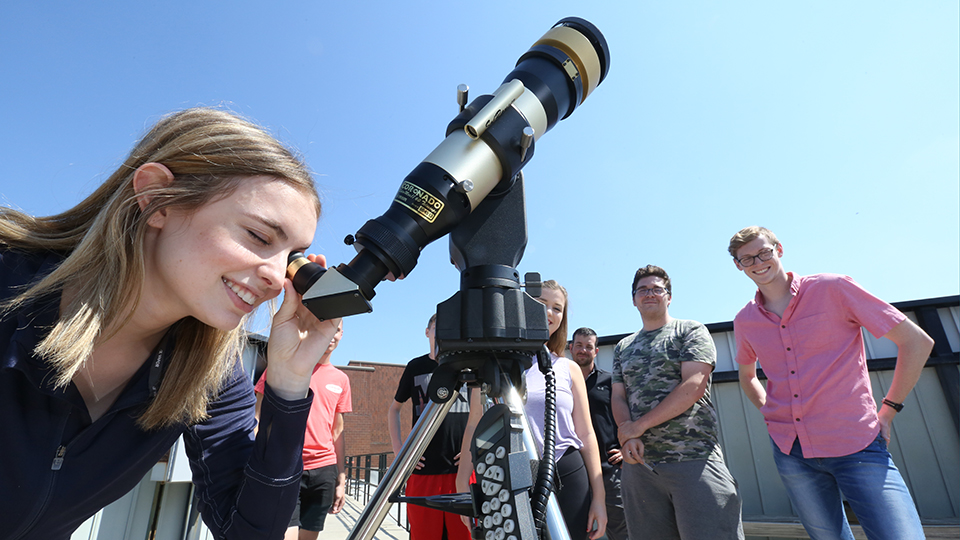Use specialized telescopes and deepen your understanding of the universe with classes that count toward an associate degree or transfer to a 4-year university.

Earn science credits online or on-campus
Astronomy courses expand your skillset and knowledge of physics, mathematics, computer programming, and statistics as you learn more about the sun, moon, planets, stars, and other deep space objects. You study the entire universe — from the Earth, moon and planets to the stars, black holes quasars and distant galaxies. Ponder the origin of the universe and whether there is life on other planets.
JCCC Astronomy courses are approved by the Kansas Board of Regents. These two classes transfer to any Kansas postsecondary public institution and many other four-year schools:
- ASTR 120 Fundamentals of Astronomy is an online 3-credit hour course. Choose this option if you’ve already fulfilled your science lab requirement and would like to learn more supplemental information, or if you want a more flexible schedule.
- ASTR 122 Astronomy is an on-campus 4-credit hour course. This class can fulfill your science lab requirement through five 45-minute observation sessions to gaze at the cosmos.
View the stars up close at JCCC’s Observatory
The Paul Tebbe Observatory is home to the same equipment found at many four-year schools. It includes:
- Two mounted 12-inch reflecting telescopes with removable hydrogen-alpha filters for observing the sun
- Four 8-inch reflecting telescopes that can be placed on hard mounts on the observing deck or upon portable tripods
- Astronomical CCD cameras that capture remarkable, detailed images
- A dedicated, portable solar telescope with a built-in hydrogen-alpha filter
- A special camera to track nearby meteor traffic and trajectories
- Red lights to maximize night vision during observations
Connect Astronomy to an Honors Program contract for a deeper, personal learning experience. Work with a faculty mentor to work on a research project or personalized topic of study that will enrich your transfer application and resume.
Discover stellar jobs in Astronomy
Get a bachelor’s degree in astronomy to pursue a rewarding career in national observatories, research centers, private industries, museums, or planetariums as a:
- Science educator
- Laboratory technician
- Computer programmer
- Science journalist
You can also choose to enter a graduate program as another step on the path toward becoming a professional astronomer.
JCCC Transfer Information and Services has information on transferring your JCCC credits to another school. Make an appointment with a counselor to explore your options.
Need help with Astronomy and other homework? No problem!
The JCCC Academic Resource Center offers free tutoring in almost any subject. Most Astronomy classes have fewer than 25 students, providing you with one-on-one attention and more discussion time with your professors.
Contact info
Lori Slavin, Chair
Phone: 913-469-8500, ext. 3133
Location: CLB 329
Email: lslavin1@jccc.edu

